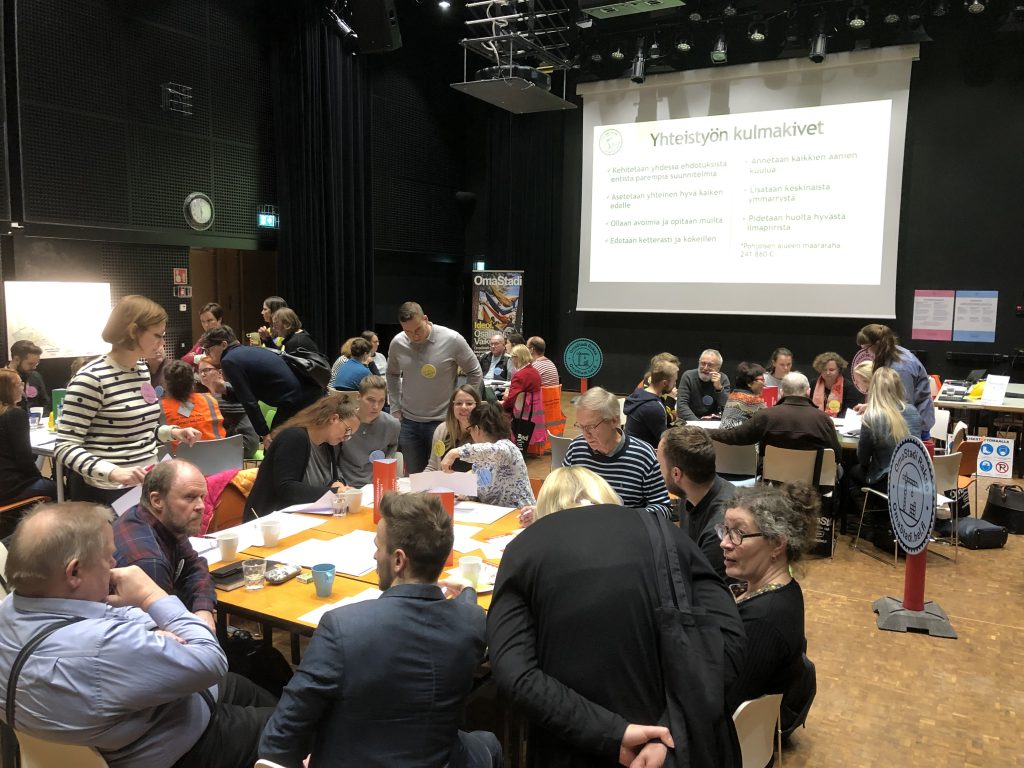Based on the premise that location-based and design-based dialogue tools can strengthen the potential of existing digital Participatory Budgeting (PB) platforms to include voices of vulnerable groups, the COLDIGIT project run pilot projects under theme 4. The existing PB platforms used in case cities (e.g., Decidim) will be the starting point. This page introduces three pilot projects in Helsinki, Gothenburg and Trondheim. The detailed reports of the three cases can be found below:
PB project in Helsinki, Finland
Helsinki report: COLDIGIT WP4 Helsinki Report D4-2 (V1)
We conduct a digital pilot with the City of Helsinki’s PB process OmaStadi. In the first round of PB (budget €4.4 million) the Decidim platform was used in combination with the Co-creation Radar Evaluation model. In the second round, support for marginalized groups (e.g., Russian–speaking populations) will be in focus and the AI tools to evaluate the online engagement and the analysis of user-generated data (e.g., statistical network analysis, topic modelling).

PB project in Gothenburg, Sweden
Gothenburg report: COLDIGIT WP4 Gothenburg Report D4-3 (V1)
The pilot in Gothenburg has been carried out by Digidem Lab. Bostadsbolaget, one of Sweden’s largest public housing companies, in 2019 conducted a PB in one of their housing areas, using Consul. This was the first housing company PB in a Nordic country. In 2020 the same housing company were doing their second PB with 5 000 tenants. In 2021, Bostadsbolaget were doing their third PB, using Decidim for the first time. Most tenants in the two housing areas where PB has been implemented (Biskopsgården and Hammarkullen) have Swedish as a second language and the poverty rate is high compared to the average in the city. Immigrants are underrepresented in decision-making, the potential of applying CI solutions to reduce the participation gap is therefore of great interest. In addition, The University of Gothenburg has an ongoing cooperation with The Swedish Union of Tenants, working closely with civil society including vulnerable groups, which gives the opportunity to pair digital efforts with face-to-face methods to build trust.
PB project in Trondheim, Norway
Trondheim report: COLDIGIT WP4 Trondheim Report D4-4 (V1)
This pilot with the City of Trondheim is led by SINTEF.
At the end of 2021, the municipality of Trondheim organized a citizens’ assembly with the goal of getting input to the municipality master plan, the most important overall plan in municipality that guides all planning in the municipality in the years to come. Composed of 50 quasi-randomly selected citizens, the initiative represented the first of its kind in terms of its scale. From November 2021 to February 2022, the selected citizens met regularly to discuss social challenges and explore potential solutions to address them.
Our research has investigated the experiences from participating to assembly, both from a citizen’ viewpoint and a civil servant’ viewpoint. These results indicate that the citizens’ assembly was well-organized and strongly anchored in the municipality. The main weak point related to the absence of the politicians’ participation in the debate. The overall goal for the assembly was highly ambitious and most of the identified shortcomings related to the complexity of the overall goals.
Digital tools were used in a little extent during the course of the assembly. Some information about the purpose of the assembly and the plan for the meetings were shared on the digital Decidim-based platform Borgerkraft (“citizens’ power”). Results of the assembly were however intentionally not shared online. The municipality lacks experience of using this kind of technology in conjunction with an assembly and was worried about the impact of external comments on the progress of the assembly. external comments that could jeopardize the progress of the assembly. The municipality is however open for exploring digital tools in next participation processes and foresee they can be used to make sense of the information and to present it in a more easy-to-understand way. The draft municipal master plan was made available on Borgerkraft in the public hearing phase. However little feedback was collected through this channel.
These results of the research in Trondheim external comments that could jeopardize the progress of the assembly external comments that could jeopardize the progress of the assembly can inform municipalities who intend to implement citizens’ assemblies.
